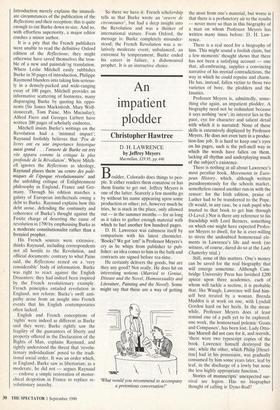An impatient plodder
Christopher Hawtree
D. H. LAWRENCE by Jeffrey Meyers Macmillan, £19.95, pp.446 Boulder, Colorado does things to peo- ple. It either renders them comatose or has them frantic to get out. Jeffrey Meyers is one of the latter. Scarcely a few months go by without his name appearing upon some production or other; yet, however much he tries, he is stuck in the place, only allowed out — in the summer months — for as long as it takes to gather enough material with which to fuel another few hundred pages.
D. H. Lawrence was calmneSs itself by comparison with his latest chronicler. 'Books? We got 'em!' is Professor Meyers's, cry as he whips from publisher to pub- lisher: an idea comes to him in the bath and contracts are signed before tea-time.
He certainly delivers the goods, but are they any good? Not really. He does hit on interesting notions (Married to Genius, Disease and the Novel, Homosexuality and Literature, Painting and the Novel). Some might say that these are a way of getting 'What would you recommend to accompany a pretentious conversation?' the most from one's material, but worse is that there is a perfunctory air to the results — never more so than in this biography of a man on whom Professor Meyers has written many times before: D. H. Law- rence.
There is a real need for a biography of him. This might sound a foolish claim, but a few moments' thought shows that there has not been a satisfying account — one that, all-embracing, supplies a convincing narrative of his myriad contradictions, the way in which he could repulse and charm. He has, instead, fallen victim to those two varieties of bore, the plodders and the fanatics.
Professor Meyers is, admittedly, some- thing else again, an impatient plodder. A biography need not be redundant because it says nothing 'new'; its interest lies in the pace, eye for character and salient detail with which it is narrated: None of these skills is extensively displayed by Professor Meyers. He does not even turn in a produc- tion-line job. It is hard to keep one's eyes on his pages, such is the pell-mell way in which the words have fallen on them, lacking all rhythm and underplaying much of the subject's existence.
There is nothing at all about Lawrence's most peculiar book, Movements in Euro- pean History, which, although written
pseudonymously for the schools market, nonetheless caused another run-in with the censor: for the Irish edition, praise of Luther had to be transferred to the Pope. (It would, in any case, be a rash pupil who trusted to that book to get him through 0-Level.) Nor is there any reference to his friendship with Lord Berners, something on which one might have expected Profes- sor Meyers to dwell, for he is ever-willing to stress the undoubted homosexual ele-
ments in Lawrence's life and work (no witness, of course, dared do so at the Lady Chatterley trial.)
Still, none of this matters. One's money can be saved for the real biography that will emerge sometime. Although Cam- bridge University Press has lavished £200 apiece upon three academics, each of whom will tackle a section, it is probable that, like Waugh, Lawrence will find him- self best treated by a woman. Brenda Maddox is at work on one, with Lyndall Gordon hard on her heels. In the mean- while, Professor Meyers does at least remind one of a path yet to be explored: one work, the homosexual polemic 'Goats and Compasses', has been lost. Lady Otto- line Morrell did not care for it, and records, 'there were two typescript copies of the book. Lawrence himself destroyed the one, while the other, which Philip [Hesel- tine] had in his possession, was gradually consumed by him some years later, leaf by leaf, in the discharge of a lowly but none the less highly appropriate function.'
Stories of manuscripts' unexpected sur- vival are legion. Has no biographer thought of calling in Dyno-Rod?


















































 Previous page
Previous page